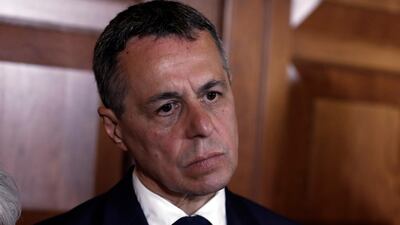More than a decade of Swiss-EU talks that sought to seal a comprehensive co-operation deal have ended without success.
It risks damaging relations between the sides after they failed to resolve fundamental differences on issues such as state aid, wage protection and freedom of movement.
About half of Swiss exports go to the EU, while two thirds of the bloc’s go to Switzerland.
The federal government of Switzerland said "there remain substantial differences" on "key aspects" of the negotiations.
"The conditions are thus not met for the signing of the agreement,” it said as it withdrew from the talks.
The EU’s demand that its citizens, including those seeking employment, had full access to Switzerland’s labour market, was resisted by the Swiss. Bern said such a move could allow foreign citizens the right to social security in the country.
The European Commission, the EU’s executive branch, described the Swiss withdrawal as a “unilateral” move.
It said the core purpose of the proposed co-operation agreement “was to ensure that anyone operating in the EU single market, to which Switzerland has significant access, faces the same conditions”.
“That is fundamentally a matter of fairness and legal certainty,” the Commission said. “Privileged access to the single market must mean abiding by the same rules and obligations.”
Without an agreement, the Commission said “this modernisation of our relationship will not be possible and our bilateral agreements will inevitably age”.
Swiss officials are under pressure to limit the number of EU citizens in the country and a nationalist, populist party holds the most seats in its parliament.
Foreign Minister Ignazio Cassis said the potential cost of accepting the EU’s demands was only part of the equation.
“A very important element, which the federal council perhaps considered more serious, was the political dimension,” he said. “If there's one issue that's delicate and sensitive in the population, it's the issue of free movement."
But he rejected any comparison to the UK's decision to leave the EU, insisting that Switzerland wanted to retain strong ties with the bloc.
“This shouldn’t be compared with Brexit at all. Brexit was the exact opposite,” Mr Cassis said. “They [the British] took a step backward and wanted to completely distance themselves. So it’s a totally different logic than that of Brexit, and we are not before a cliff edge.”


